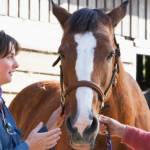New Vaccine for African Horse Sickness Tested

African horse sickness, a disease that is fatal in up to 90% of affected horses, is caused by an orbivirus of the Reoviridae family. Nine serotypes of the virus, AHSV-1 to AHSV-9, have been described. Most cases are reported from sub-Saharan Africa, but outbreaks have occurred in northern Africa, Pakistan, India, Portugal, and Spain. Disease experts are concerned that African horse sickness could spread to Europe, and some evidence shows that this possibility is growing.
The illness is transmitted by Culicoides midges. These biting insects also spread bluetongue virus, a disease of sheep and cattle. In the last five years, climate change has allowed bluetongue virus to spread northward in Europe. As the insect vector increases its range, there is little reason to doubt that African horse sickness will eventually follow the same pattern. This disease could severely impact the horse industry in Europe, as most of the equine population has not been exposed to the virus and has no resistance to infection.
A live-attenuated polyvalent AHSV vaccine is used to control the disease in Africa, but this type of vaccine is not without some problems. Vaccinated horses develop viremia, a condition in which virus particles circulate and reproduce in the bloodstream. Midges biting these horses could potentially acquire the virus and transmit it to other horses. Also, horses that have been immunized with the vaccine are not completely protected and can still be infected, sometimes subclinically, with the disease.
A new recombinant vaccine developed by researchers from Spain and the UK shows promise and may replace the present protocol for protecting horses. To make a recombinant vaccine, bacteria or yeast are used to produce large quantities of a single protein from a virus. After the protein is purified and injected into the patient, the immune system is stimulated to make antibodies to the viral protein. The patient is then protected from infection and can’t develop or spread the disease. The AHSV-4 serotype was used to make the new vaccine, and testing showed that mice tested with the product generated significant levels of antibodies and T cell responses against the viral strain. The mice also developed protection against the AHSV-9 serotype.
Though a commercial equine vaccine is not yet on the market, development of this product may offset the threat of African horse sickness for European horses.








